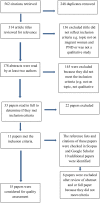Migrant women's experiences, meanings and ways of dealing with postnatal depression: A meta-ethnographic study
- PMID: 28296887
- PMCID: PMC5351835
- DOI: 10.1371/journal.pone.0172385
Migrant women's experiences, meanings and ways of dealing with postnatal depression: A meta-ethnographic study
Abstract
Aim: To conduct a meta-ethnographic study of the experiences, meanings and ways of 'dealing with' symptoms or a diagnosis of postnatal depression amongst migrant women living in high income countries.
Background: Prevalence of postnatal depression is highest amongst women who are migrants. Yet many women do not seek help for their symptoms and health services do not always respond appropriately to migrant women's needs. Studies have reported migrant women's experiences of postnatal depression and it is timely to synthesise findings from these studies to understand how services can be improved.
Design: A meta-ethnographic synthesis of 12 studies reported in 15 papers.
Data sources: Five databases were searched for papers published between January 1999 and February 2016.
Review methods: The quality of included studies was assessed using the Critical Appraisal Skills Program tool. The synthesis process was guided by the seven steps of meta-ethnography outlined by Noblit and Hare.
Findings: Four key metaphors were identified: "I am alone, worried and angry-this is not me!"; 'Making sense of my feelings' 'Dealing with my feelings' and 'What I need to change the way I feel!'. Primarily women related their feelings to their position as a migrant and as women, often living in poor socio-economic circumstances and they were exhausted keeping up with expected commitments. Many women were resourceful, drawing on their personal strengths and family / community resources. All the studies reported that women experienced difficulties in accessing appropriate services.
Conclusion: The meta-ethnographic study demonstrates the impact of migration on perinatal mental health, particularly for women lacking family support, who have no employment, a precarious migration status and/or relationship conflict. Migrant women are resourceful and this requires support through appropriate services. Further research is needed to evaluate effective support strategies for migrant women in the perinatal period.
Conflict of interest statement
References
-
- Westall C, Liamputtong P. Motherhood and postnatal depression: narratives of women and their partners: Springer Science & Business Media; 2011.
-
- Woolhouse H, Gartland D, Mensah F, Brown S. Maternal depression from early pregnancy to 4 years postpartum in a prospective pregnancy cohort study: implications for primary health care. BJOG: An International Journal of Obstetrics & Gynaecology. 2015;122(3):312–21. - PubMed
MeSH terms
LinkOut - more resources
Full Text Sources
Other Literature Sources
Medical
Miscellaneous



